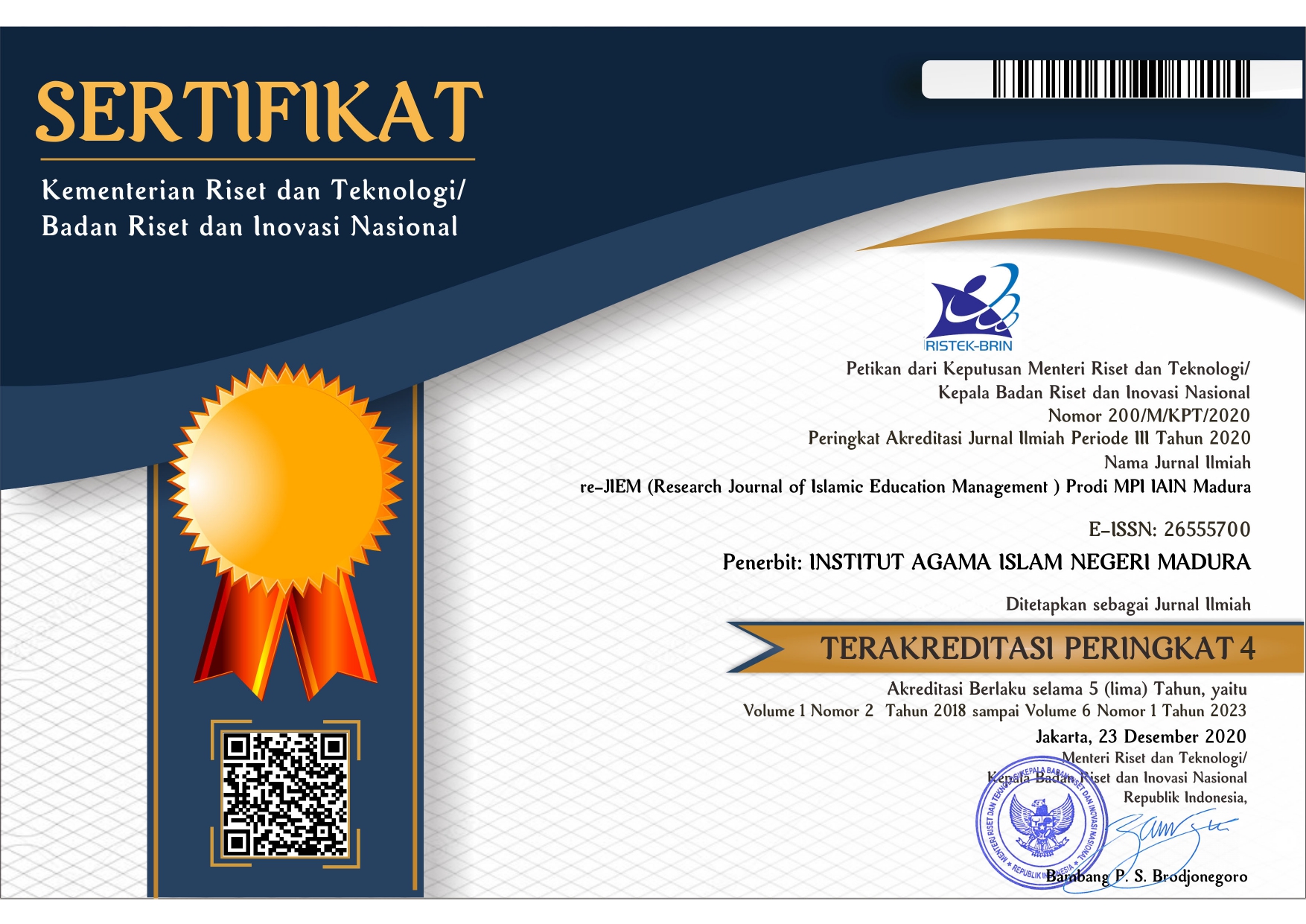PELAKSANAAN PENILAIAN AUTENTIK DI MADRASAH (STUDI PADA GURU MATEMATIKA DI MADRASAH TSANAWIYAN NEGERI 2 BUKITTINGGI)
 Abstract views: 891
,
Abstract views: 891
,
 PDF downloads: 724
PDF downloads: 724
Abstract
The 2013 curriculum emphasizes teachers to carry out authentic assessments. Authentic assessment is an assessment that is actually carried out on students. The implementation of this authentic assessment emphasizes the process rather than the results. It is very important for teachers to carry out authentic assessments in the classroom and outside the classroom to students in order to know the progress of student learning. This study aims to analyze the obstacles and solutions of Madrasah mathematics teachers in the implementation of authentic assessments. This research was conducted at Madrasah Tsanawiyah Negeri 2 Bukittinggi. This study involved 4 Madrasah mathematics teachers, hereinafter referred to as research subjects. Data or information related to obstacles and solutions for implementing authentic assessments were obtained through interviews. The results of this study include: Madrasah mathematics teachers encounter obstacles in planning, implementing, and reporting authentic assessments. These obstacles can be solved with solutions: increasing professional competence, participating in various pieces of training, playing an active role in teacher consultation activities both with one madrasa teacher and with outside madrasa teachers, being active in scientific meetings, and further studies such as through teacher professional education and masters degree.
Downloads
References
Cangelosi, J.S. Merancang Tes Untuk Menilai Prestasi Siswa. Bandung: IT, 1995.
Custer, R. L., et al. Using Authentic Assessment In Vocational Education. Clearinghouse On Adults, Career, And Vocational Education. (The Ohaio State University. 2000).
Dasmalinda & Hasrul, Penerapan Penilaian Autentik Dalam Kurikulum 2013 Pada Pembelajaran Pendidikan Pancasila Dan Kewarganegaraan. JURNAL CIVICS: Media Kajian Kewarganegaraan 17. 1 (2020)
Imamuddin, M., and Isnaniah Isnaniah. "PERENCANAAN, PELAKSANAAN, DAN PELAPORAN PENILAIAN AUTENTIK OLEH GURU MATEMATIKA MADRASAH." KARIWARI SMART: Journal of Education Based on Local Wisdom 2.1 (2022): 65-75. https://doi.org/10.53491/kariwarismart.v2i1.154
Imamuddin, M., et al. "Integrasi Pendidikan Matematika dan Pendidikan Islam (Menggagas Pembelajaran Matematika di Madrasah Ibtidaiyah)." AR-RIAYAH: Jurnal Pendidikan Dasar 4.2 (2020)
Magdalena, I., Apriansyah, F., Ristavania, F., & Kurniawan, W. “PELAKSANAAN PENILAIAN AUTENTIK KURIKULUM 2013 PADA PEMBELAJARAN TEMATIK SDN CURUG 01. PANDAWA”: Jurnal Pendidikan dan Dakwah 3. 1 (2021): 129-140. https://ejournal.stitpn.ac.id/index.php/pandawa
Majid, A. Perencanaan Pembelajaran. Bandung: PT. Remaja Rosdakarya, 2007.
Merta, I.M.E.D., Suarjana, I.M., & Mahadewi, L.P.P. “Analisis Penilaian Autentik Menurut Pembelajaran Kurikulum 2013 Pada Kelas IV SD No. 4 Banyuasri.” e-Journal PGSD Universitas Pendidikan Ganesha Jurusan PGSD, 3. 1 (2015).
Metro Andalas.co.id. Aplikasi Raport K13 SD. Tanggal 28/03/2022. https://metroandalas.co.id, diakses pada tanggal 12 April 2022.
Moleong, Lexy J. Metodologi Penelitian Kualitatif. Bandung: Remaja Rosdakarya, 2016.
Newman, F.M., & Wehlage, G.G. Five Standards of Authentic Instruction. Educational Leadership. (April, 1993).
Nizar, Moh. “PENINGKATAN KEMAMPUAN GURU DALAM PENGGUNAAN TEKNOLOGI INFORMASI DAN KOMUNIKASI (TIK) UNTUK PEMBELAJARAN DARING MELALUI WORKSHOP DI UPTD SDN AENGSAREH 1 KECAMATAN SAMPANG KABUPATEN SAMPANG.” Re-JIEM (Research Journal of Islamic Education Management) 4, no. 1 (2021). https://doi.org/10.19105/re-jiem.v4i1.4869.
Nurhadi, Ali. "Perubahan Organisasi Bagi Pengelola Madrasah Dalam Menghadapi Persaingan Global." AL-FIKRAH: Jurnal Studi Ilmu Pendidikan dan Keislaman 1.1 (2018).
Nurhayati, E., Jayusman, & Ahmad, T. A. “Implementasi Penilaian Autentik dalam pembelajaran Sejarah di SMA Negeri 1 Semarang.” Indonesian Journal of History Education 6. 1 (2018)
Nurisman, D. K., & Syaodih, E. “PERENCANAAN PENILAIAN AUTENTIK KURIKULUM 2013: JENIS JENIS PENILAIAN AUTENTIK”. Edusentris: Jurnal Ilmu Pendidikan dan Pengajaran 4. 3 (2017).
Nurhadi, Ali, and Dedi Yusup. “Manajemen Pembelajaran Berbasis Pendekatan Perubahan Perilaku Dalam Meningkatkan Motivasi Belajar Siswa Di Smp Negeri 3 Pademawu Pamekasan.” Re-JIEM (Research Journal of Islamic Education Management) 2, no. 2 (2019): 288. https://doi.org/10.19105/re-jiem.v2i2.2871.
Popham, W.J. Classroom Assessment: What Teacher Need To Know. Los Angeles: Allyn and Bacon, 1995.
Rochmawati, Ida. “Optimalisasi Peran Madrasah dalam Pengembangan Sistem Nilai Masyarakat.” Jurnal Padagogia, Vol. 1. No. 2 (Juni 2012).
Sardiman. Interaksi Dan Motivasi Belajar Mengajar. Jakarta: Rajawali Pers, 2014.
Sayadi. “Pelatihan Menyusun Rencana Pelaksanaan Pembelajaran Harian Dalam Meningkatkan Kinerja Guru Nonformal Di Korwil Bidang Pendidikan Kecamatan Kokop Kabupaten Bangkalan” Re-JIEM (Research Journal of Islamic Education Management) 4, no. 1 (2021).
Setiadi, H. “PELAKSANAAN PENILAIAN PADA KURIKULUM 2013”. Jurnal Penelitian dan Evaluasi Pendidikan 20. 2 (2016): 166-178
Solichin, Muchlis, Moh. Hafidz, and Hilmi Qosim Mubah. “Kualitas Program Persiapan Guru Tugas Di Pondok Pesantren Mambaul Ulum Bata-Bata Panaan Palengaan Pamekasan.” Re-JIEM (Research Journal of Islamic Education Management) 2, no. 2 (2019): 305. https://doi.org/10.19105/re-jiem.v2i2.2870.
Syah, Darwyn. Perencanaan Sistem Pengajaran Pendidikan agama Islam .Bandung: Remaja Rosdakarya, 2011.
Syah, Muhibbin. Psikologi Pendidikan .Bandung: PT. Remaja Rosdakarya, 2009.
Copyright (c) 2022 Imamuddin M.

This work is licensed under a Creative Commons Attribution-ShareAlike 4.0 International License.
Authors who publish with this journal agree to the following terms:
Authors retain copyright and grant the journal the right of first publication with the work simultaneously licensed under a Creative Commons Attribution-ShareAlike 4.0 International License that allows others to copy and redistribute the material in any medium or format with an acknowledgment of the work's authorship and initial publication in this journal and also allows them to remix, transform, and build upon the material for any purpose, even commercially, with contributions under the same license as the original.
Authors are able to enter into separate, additional contractual arrangements for the non-exclusive distribution of the journal's published version of the work (e.g., post it to an institutional repository or publish it in a book), with an acknowledgment of its initial publication in this journal.
Authors are permitted and encouraged to post their work online (e.g., in institutional repositories or on their website) prior to and during the submission process, as it can lead to productive exchanges, as well as earlier and greater citation of published work.




















